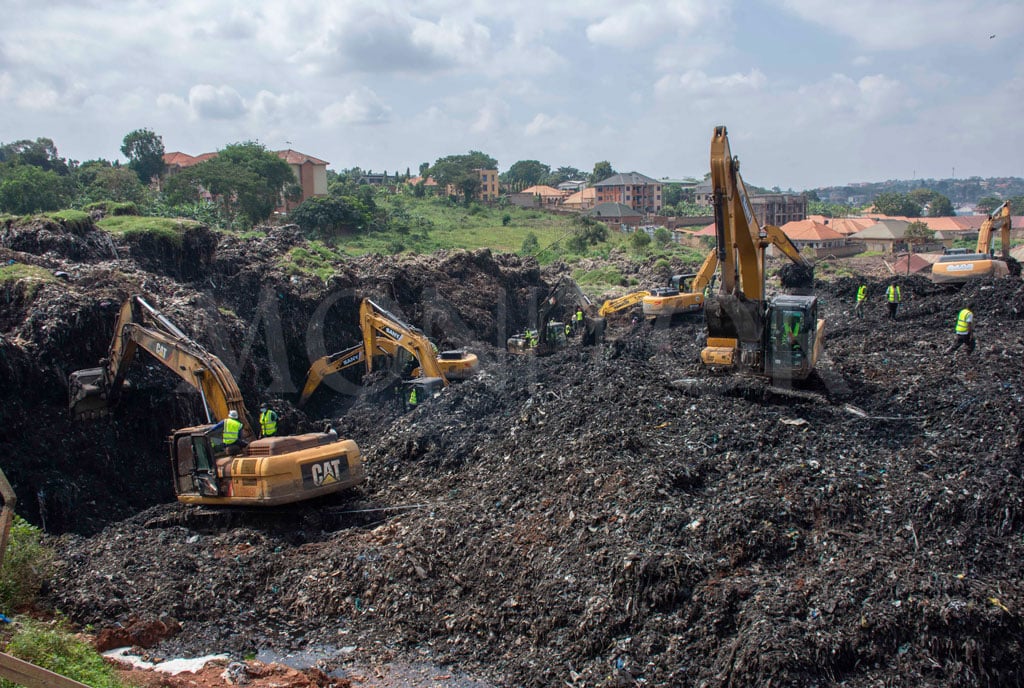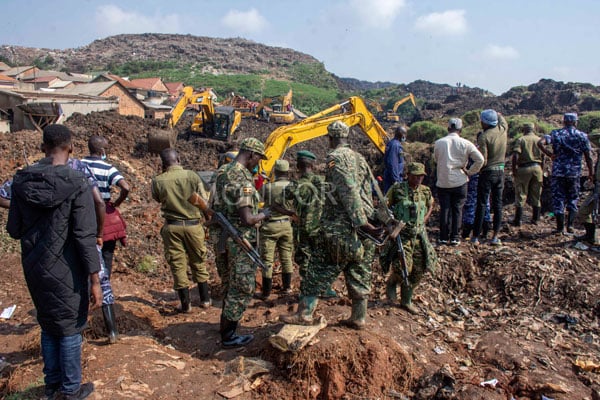
Some of the houses neighbouring Kiteezi landfill in Wakiso District. Despite the government issuing warnings that the site is no longer safe amid fears that another accident may occur, some locals continue to defy the directive. PHOTO |
MICHAEL KAKUMIRIZI
The Kiteezi landfill tragedy is a few days shy of a two-months anniversary. The grief is still too raw for survivors and bereaved families.
The gut-wrenching calamity befell residents of Kiteezi in Wakiso District on August 10, claiming the lives of more than 35 people and destroying properties, including homes.
Mr David Ssekeba, 24, lost his mother, Jessica Nantege, and younger brother, Timothy Kisuule, in the incident.
“I still mourn over their deaths,” Mr Ssekeba told this publication in a Monday interview.
“The toughest times are when I am going through my phone and see their pictures. It is so painful and often, I break down," he said.
The landfill collapsed on Nantege and her son, Kisuule when both were asleep. The incident occurred during the early morning hours. Mr Ssekeba is currently staying at Kiteezi Church of Uganda Primary School playground where a temporary shelter was erected for survivors.
Ms Alice Nakate is among those who lost a home during the tragedy. “Everything was buried under the decomposing garbage,” she said, adding: “I survived because I was not at the location when the incident happened. I had spent the night at another family member’s home.”
Asked how she currently finds life at the camp, Ms Nakate said “things are fair.”
“I know it has been weeks since the incident happened, but I am still coming to terms with the fact that I lost my home. It still hurts, a lot,” she said.
Although the Uganda Red Cross Society, which erected the shelter, continues to care for the affected individuals, Ms Nakate said she cannot just sit around waiting for handouts.
“Once in a while, I step out of the shelter and move around, sketching for what to do. My efforts have, however, been in vain," she said.
By Monday, the total number of Kiteezi residents staying at the camp stood at 233, the Uganda Red Cross Society communications and media
relations officer, Mr John Cliff Wamala, said.
With some children continuing to report back to school, the numbers keep dwindling. The highest number of occupants at the shelter was previously at 374.
What is happening at the landfill?
About a 40-minute walkable distance away from the shelter still stands the remaining part of the gigantic hill molded by years of rubbish build-up. A heavy stench of rotting garbage lingers about in the air as one nears the dump site.
The vicinity is a beehive of activities on a Monday morning. A section of men and women, some clad in overalls and gumboots, make their way to work at the dump site. They earn a living as sorters going through the disposed of garbage to find valuable items to either
sell or recycle.
Ms Rosemary Nalwoga, 44, who this reporter found going through an assortment of rubbish at the dumpsite, said this is how she has been earning a living for the past 10 years after failing to get jobs elsewhere.
“Some community leaders have been encouraging us to find alternative work, reasoning that working at the dump site is dangerous, and that it poses serious health risks.
But where are the other jobs?
I have tried looking for them and failed. I will stick here for now,” Ms Nalwoga said.
Despite the government issuing warnings that the site is no longer safe amid fears that another accident may occur, some locals continue to defy the directive. Specifically, those staying within a 200-metre radius of the remaining landfill were advised to vacate the area.
“I leave my house and go where? Yes, I have been hearing the government talking about compensation and whatnot but is the plan to compensate all of us here?” Mr David Musoke, a resident, wondered.
The dump site has been operational for the last 28 years. To address the current garbage crisis in the city, the Cabinet, among its resolutions, recently ordered the disbursement of Shs16b from the contingency funds for the acquisition of alternative land for the establishment of a waste management facility.
To bring the plan to fruition, Kampala Capital City Authority (KCCA), through its Procurement and Disposal Unit (PDU), made a public advertisement inviting potential bidders to express interest with clear specifications, including the land not being less than 200 acres and not located in environmentally sensitive areas such as wetlands.
The process for acquisition of the alternative land has, however, been halted amidst reports of internal woes at the KCCA.
Compensation
Shortly after the calamity, the government promised to give Shs1m to individuals who had sustained injuries and Shs5m to families that had lost loved ones.
Speaking to this publication on Monday, the Office of the Prime Minister (OPM) spokesperson, Mr Charles Odongtho, said all those who were injured during the calamity have been compensated.
“I was there in person at Kiteezi Police Station and everybody [previously verified by police and local authorities] was paid on September 11,” Mr Odongtho said.
Some bereaved families have also been compensated.
“For those who lost their loved ones, their money is available. State House released that money to the OPM through the State Minister for Disaster Preparedness [Ms Lillian Aber]. The verification for recipients is being done through the police and local leaders [which] took some days but at least everybody who was verified was paid for their lost loved ones,” Mr Odongtho said.
For families that have not been paid yet, Mr Odongtho advised them to visit their offices with the required documentation.
“If there is anyone who has not yet been paid but unfortunately lost a loved one, they will be paid as the money is available at the OPM. All they have to do is present themselves with evidence of the death certificate [of their loved one], evidence of the burial site, including acknowledgment [in documentation] from the area leader where the person was buried,” he advised grieving families.
The OPM, by next week, also plans to relocate everyone staying at the shelter to other suitable locations once the funding and resources have been fully inaugurated.
“That is the plan at the OPM. There is supposed to be some assistance given to those who were renting in those places [houses] that were destroyed. Others will be taken to safer zones,” Mr Odongtho said while promising to avail this publication later on an unspecific date with information on the specific places the affected individuals will be relocated to.
Uncertainty
Although some of the affected residents applaud the government on the relocation plan, they still have doubts and fears about the processes involved.
“I will wait and see how this whole relocation plan goes. These things are not always straight forward as they seem,” one survivor who preferred anonymity to speak freely, said.
“They have been asking for documentation, which I do not have as the paperwork was buried under the garbage heap. But I provided all the information they asked for, things I could faintly remember, and now wait to see whether I will be compensated or not.”
Other survivors and grieving families are choosing not to wait for the government’s aid. Some have relocated to other safer localities, while others have moved in with relatives to rebuild their lives.
BACKGROUND
What exactly happened
In the early morning hours of Saturday, August 10, part of the Kiteezi landfill collapsed, a tragedy that led to the loss of more than 30 residents and also the destruction of property, including houses. Some of the people who lost their lives were still sleeping, while others had gone to work at the dump site.
The incident caused a nationwide uproar, with Ugandans calling upon KCCA and other government authorities to step up their game on proper waste management.
Waste problem in Kampala
A 2023 Kampala Waste Management report says Kampala City generates between 2,000 and 2,500 tonnes of waste daily, but is only able to collect and dispose of an average of 1,300 to 1,500 tonnes per day.
KCCA has previously partly cited inadequate transport containers, vehicles and lack of enforcement of regulations as major challenges they face in proper waste management.




